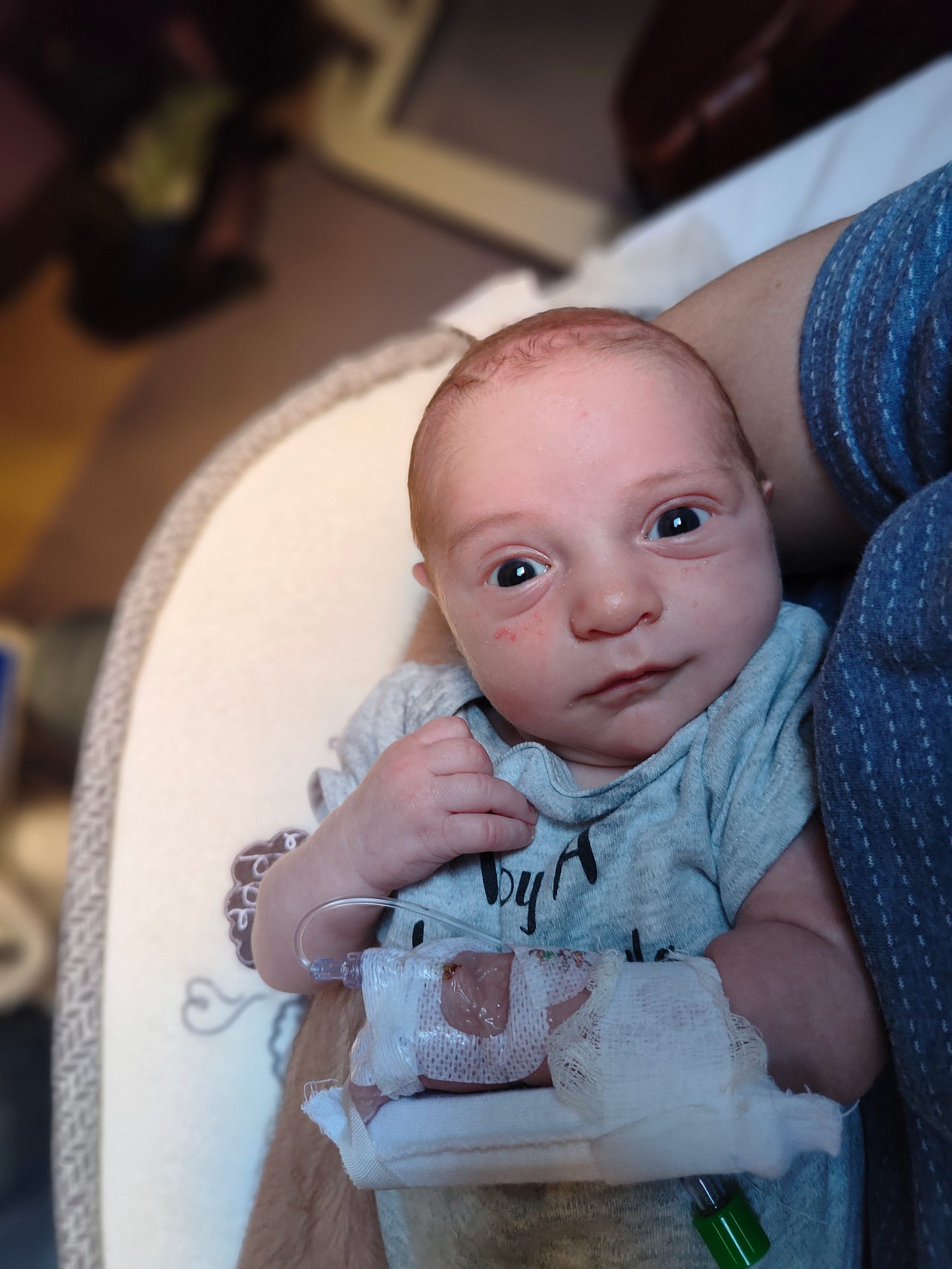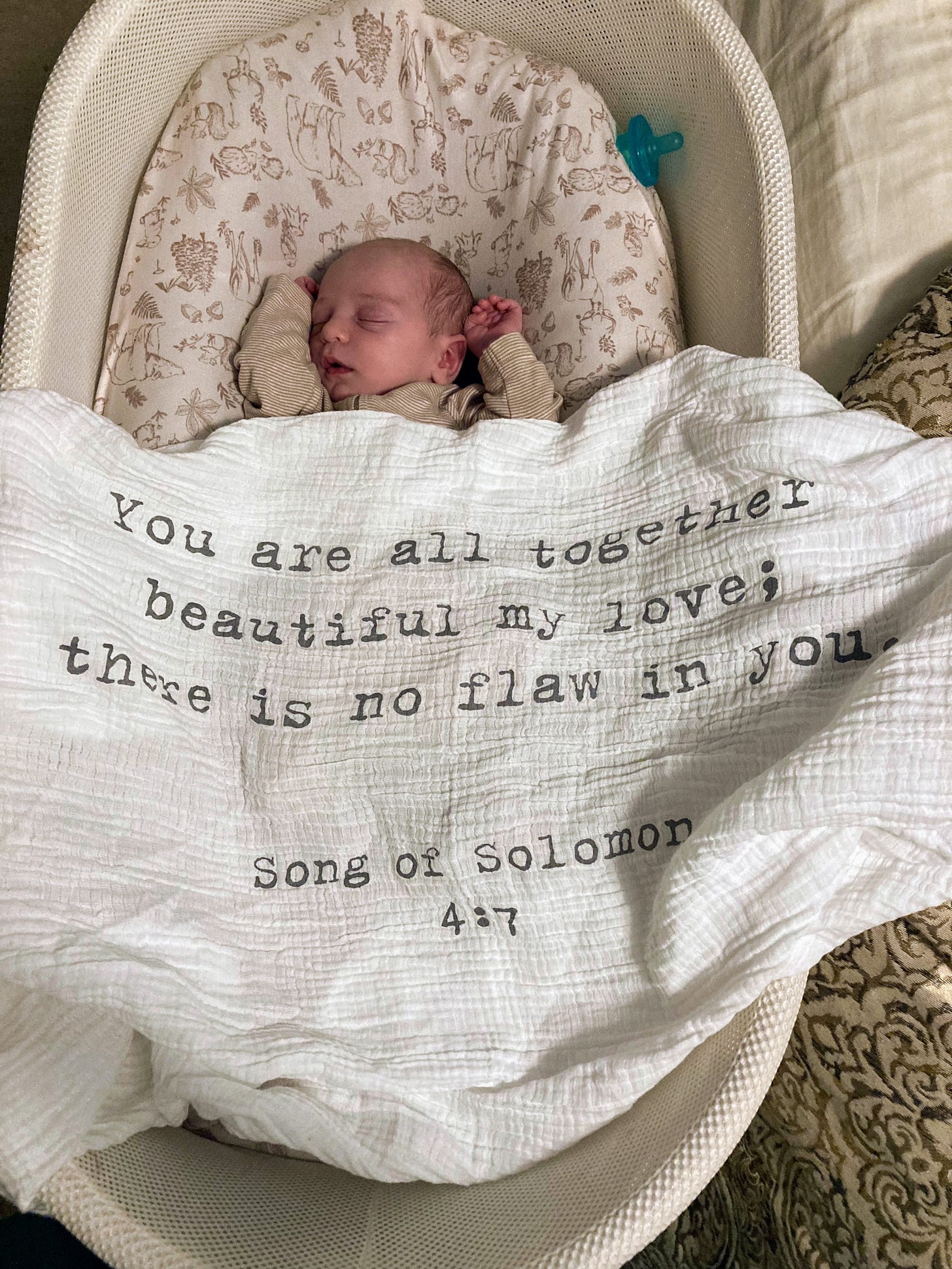They pointed Joseph and me to a small waiting area on the emergency floor. Half the space was taken up by some kind of shrouded medical equipment, lending the space an even greater aura of sterility than the rest of the hospital. We sat on the stiff chairs and stared at the speckled linoleum tiles as we waited to be let back into the room where they were taking a sample of our two-week-old’s spinal fluid to test him for bacterial meningitis.
I leaned against Joseph’s shoulder and he pulled a stiff blanket over us to shield us from the hospital cold. It was about 4:30 in the morning and we’d been awake since 1:30 am, when Westley’s fever—which had been wavering above 99 degrees for the past few days—had spiked to above 100.3, the temperature his pediatrician had told us warranted an ER visit for newborns. So now we were here, at Children’s Medical Center, waiting as they performed a full series of tests to rule out anything life threatening. I’d held it together through the blood tests and the swabs but only barely.
While hospital staff came in and out of the heavy automatic doors off the waiting room, I sobbed into Joseph’s arm. I kept thinking of something our six-year-old had said the week before when he stubbed his toe and needed a band-aid to stop the bleeding.
“I didn’t know it was going to happen! I didn’t want it to happen.”
I understood his childish despair, battling my rage against the injustice of the universe, wishing I could have found a way to prevent this. Feeling as though it were my fault we had ended up here. Angry, so angry, that God had let this happen. Thinking I would rather go through labor—arguably the most intense labor I had endured—all over again, rather than let my baby be in pain.
The tears didn’t stop until they had admitted us to a hospital room for multiple rounds of IV antibiotics and 24 hours of observation as we waited for the test results to come back. In some ways, the crying felt better than the pent up anxiety and exhaustion of the past few days and weeks. Really, I was venting two weeks’ worth of anxieties and frustrations, or maybe even the nine months of my pregnancy, in which I had tried so hard to lay a foundation for a peaceful postpartum period. But very little of Westley’s small life had been peaceful so far.
First, there had been the cough that spread through our family just weeks before he was born. We’d heard that whooping cough was going around our community and so had both our boys tested just to be safe. It wasn’t whooping cough, thank goodness, but it was an infection. I had the cough too, which only added to my third trimester—and eventually postpartum—discomfort. We all went on antibiotics, but that didn’t save me from overanalyzing every sound Westley made and breath he took after he was born, terrified he’d stop breathing suddenly or drop in oxygen.
At one week, I was already more physically exhausted than with my other two births because of a postpartum hemorrhage. But rest was hard to find when the fierce North Texas storms knocked out our power for four days. Thankfully, the rental property my in-laws own across the street was empty and still had power, so we camped out there with air mattresses and our perishables, thankful for the A.C., until our electricity finally came back. But relaxation was still elusive—we discovered a leak in our guest bathroom that needed immediate attention and breaking into the drywall. Meanwhile, I fought back the threat of mastitis and cut dairy out of my diet in the hopes that it would help Westley’s sudden gassiness.
Our series of crises and unfortunate events culminated in Westley’s fever and hospital stay. All of it has made it difficult to process his actual birth, which, besides the hemorrhage and intensity of pushing, was my favorite birth experience so far. It was a home birth, and I had hoped to write about it in more detail than I had my previous births. But, as in the past, words seem to evade me when it comes to describing the visceral experience of bringing a human into the world.
There is one moment I keep returning to, remembering with almost amusement. In the middle of pushing, I kept saying, “I can’t, I can’t, I can’t.” My midwife calmly kept telling me, “You’re doing great. He’s coming.” I remember feeling like I wanted to give up with Ronan and Asher’s births, but this time it was more intense, perhaps because Westley was a whole pound heavier than his brothers. And then, despite the pain, despite the overwhelming feeling that doing so would break me, I told myself I had to, and pushed him out.
I believe his birth was a kind of preparation for this postpartum. When I felt overwhelmed at the thought of leaving our house because we had no A.C., when I nursed a baby despite aches and shivering, when I held his tiny hand with the smallest IV in it and counted the hours until we could know what was wrong and leave the hospital—I told myself I just couldn’t. But then, hour by hour, minute by minute, I did anyways.
But, ultimately, I know that I did not just will myself through these hard moments. Despite how difficult these past few weeks have been, I’ve never felt more supported by a community of friends and family. My parents, who dropped everything when I went into labor, and again when Westley had a fever, to take Ronan and Asher and keep them happy and healthy and safe. My in-laws, who let us use their house and told us to make ourselves as comfortable as possible. The friend who came and fixed our busted pipe. The midwife and lactation consultant who told me which supplements to take and listened through my anxieties. The friends who brought us meals and invited the boys over for playdates to give Joseph and I a break and visited us in the hospital for moral support and listened to me vent about every misfortune. My husband and his endless dedication to taking care of me and our boys and our home (and his six-week paternity leave that means we still have some time to keep recovering).
I have always believed it takes a village to welcome and raise a baby. Our village has showed up for us in ways I hadn’t imagined before this third baby.
As I cried in that hospital waiting area, I felt myself railing against God for all He was allowing to happen to us. But, in that moment, I did not feel His censure of my anger. Rather, I felt His embrace, as though He were saying, “Yes, cry. Yes, be angry. Let me hold you through this.” And I realized that that was what He had been doing all along—through all of our trials, however frustrating or trivial or monumental—He had been supporting us through our network of friends and family. And in the hospital, as Joseph held me, He held us. I didn’t understand why He would allow this suffering, but I understood that we were not alone.
We left the hospital after thirty hours of antibiotics and no fever. When the tests came back, they weren’t able to give us a clear diagnosis: we may never know what caused Westley’s fever, but we’re thankful it was a relatively easy recovery.
Back home now, we’re willing no more disasters and no more emergencies. Regardless, I’m trying to take this postpartum one day at a time, just as I took labor one contraction at a time. Just as we took our hospital stay one hour, one IV at a time.
Still, I find myself willing Westley to grow. I imagine the giggles, the rolls, the comforting solidity of a baby more than a few weeks old. Who will he be, I wonder as his blue-black eyes rove wide in half-blindness. Who is he, already, this little person I will someday think back on and know in retrospect?
And yet I know how fleeting this time is; despite how long these past few weeks have been, a part of me feels robbed of a sacred time. What I wouldn’t give to feel less broken in body, less anxious, less scared, moment by moment, that something bad will happen again. Even after two children, I’m still afraid I will fail. That we—this little family—will break.
So I will him to grow, I will myself to heal, even as I try to cling to his smallness and the recognition of my own smallness. I’ve always wondered why God would allow new mothers to be so fragile and weak themselves as they try to care for newborns. But I’m starting to see that this fragility of my own mind and body might be part of the point—to teach me to bond with my son in these moments of our helplessness. To force me to rely on others, to see, again and again, that I cannot do this on my own. But I can do it, one moment at a time.
With this new baby, as with my other two, I have to allow myself to be born anew. I am not just healing. He is not just growing. We are becoming.
In the same way, our family is not just adjusting or transitioning. We’re becoming something new. At some hours of the day and night, three feels like way too many kids. But I know it will get easier.
In the meantime, through every trial, I know we are not alone.






Beautiful writing! Draws me in and moves my heart.